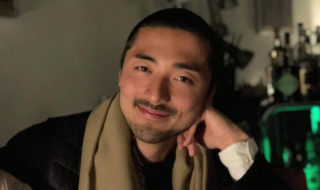On Time Travel

By Ryohei Ozaki (Princeton University 2014, CUPA Year 2012-2013)
1
As a child, I spent long summers in Japan with my grandparents in a modest house overlooking a small farm, the house where my mother had spent years of her life before she had any inkling of me or my sister, let alone of the air of a new country. When it came time to return to America, it never ceased to thrill me that, because of the way the Earth had been divided into zones of time and the speed and direction of air travel, I would arrive an hour before I had even left. Of course, relative to my friends back home, I had been thirteen hours in the future the entire summer; yet, this was somehow unremarkable, distance in time explained by distance in space. In the car home, I drifted past the familiar urban landscape and the vertigo of time travel quickly transformed into a deep fatigue and a dread of waking at three in the morning, of falling into sleep at five in the afternoon. Worse, as I got older and travelled more frequently, the thrill faded and became just another quirk of modern life, a commonplace curiosity.
2
I don’t know when, but I became aware of the phenomenon that one could travel through time without intending to do so, that time was arbitrarily ascribed to places as though by consensus, as are the measurements of latitude and longitude. I happened to be born in, then an emigrant of, a country many considered futuristic, by which they meant, simply, technologically advanced. Certainly, I could see why: their visions were full of fanciful vending machines, humanoid robots, complicated toilets and dense, urban lights, no less touted by the Japanese themselves as symbols of progress and national pride. I accepted this as a simple truth, though it meant I had unwittingly consented to the entirety of such a worldview (to say nothing of whose authority it is to propagate such worldviews), that there must exist, also, countries that look rearwards into the past. And that, it was better to exist in the future than in the past.
Only later, as a disciple of History, would I come to know that ideas of economic and social progress impose the illusion that Time moves along a linear axis toward some kind of salutary summit of wealth, financial or otherwise—and that those people, by mere contingency and circumstance, who reap the material benefits of certain knowledge (maritime and aeronautical navigation, cartography, military strategy) are further along the axis of Time than those at whose expense Time is sped up. One only has to think of decayed and decaying splendors to understand that human Time, carved like scars into the Earth by power, might, and conquest, has little to do with cosmic Time, serenely indifferent to the vicissitudes of empires.
Yet, to relegate the keeping of time to only our most aggressive impulses would, of course, be to forget our subtler inclinations. In Paris, I remember learning for the first time, a concept of time. It was said: “Did you know the ancient Greeks conceived of the past, what we can see, as in front of us, and the future, what we as yet cannot see, as behind us?” I was struck by the image of us all walking backward into the unknown; that this concept valorized memory was especially enticing. I learned of other ways to conceptualize the passage of time: cyclical, as in Vedic and Buddhist conceptions, eschatological, in the Judeo-Christian imaginary, and imbued with a pathos of the impermanent, in Heian Japan.
That I learned this in Paris is not insignificant; I learned, around the same time, that we ought to count our age beginning at twenty, when, according to Pascal, most people experience an inner birth of reason. I was, according to such math, barely one at the time. Reoriented in both conceptual space and time, I came to understand that travel was always time travel, beyond mere time zones and jet lag. I understood then, too, not intellectually but corporeally, Einstein’s propos on the enmeshed nature of space and time; there is no time without its space, and no space without its time.
3
I read, in a story by Yoko Tawada, the Japanese-German writer, that our souls cannot travel as quickly as jets nor even trains; consequently, the frequent traveller has crisscrossed the landscape so many times that her soul is left behind to wander, searching for its material home. Does time, too, pass too quickly for our souls to catch up? In my short life, how many times I have stood at a historical site of inconceivable suffering, I do not know. To remember is the ultimate time travel, communion with lost souls of the past. I’m unconvinced by Pascal—can the primacy of reason vindicate the rise and fall of civilizations, the evolution of life, the constancy of war and natural destruction, the formation of the planets and the universe? Who can understand such things? Who can claim to have reached the age of one? Or, do we age precisely when we acquire this ability to understand that there are things we will never comprehend?
So places do, after all, have times that linger in the crevices of buildings, in pockets of air in the atmosphere, and in the wrinkles around our eyes. Time is there where one looks, real only insofar as we are willing to imagine it; on the wall of the busy coffee shop around the corner from my former office in New York City, I noticed a plaque one day. The building had formed part of the Underground Railroad, the clandestine route of safehouses whereby slaves from the South could escape to the North and on to Canada, since we know better now that Northern life was no sure absolution from suffering. As I peered into the windows, no trace of such times remained, but I stood there as if transported.
Today, we need not even leave our homes to travel, albeit in a truncated form: my childhood home, whose suburban smells I can conjure up in my mind’s nose, was torn down by the subsequent owners along with the tree in the front lawn. Now and then I visited it as it used to look, frozen in time, on Google Street View. One day, I discovered the image had been updated with the current view of the street, my childhood erased. I found out that one could reinstate the past with a simple click, and there it was, le temps retrouvé. The tree where the robins nested each spring—where once a horrifying sound woke us up, and we found the chicks eviscerated by a raccoon—the blinding winter sun on a January day in 2008, the garage which kept my bicycle, the one I tumbled off of on my first ride and my means of transport to the public library, all was there. Perhaps I was there as well, somewhere inside. I was flooded with emotion, the same I felt when I first saw my grandparents as children or young adults, in black and white and grainy photographs.
4
That night I dreamt I was once again a child, exploring the rooms of that house, and awoke, jolted, disoriented by the immense sliver of space separating the present from the past.

